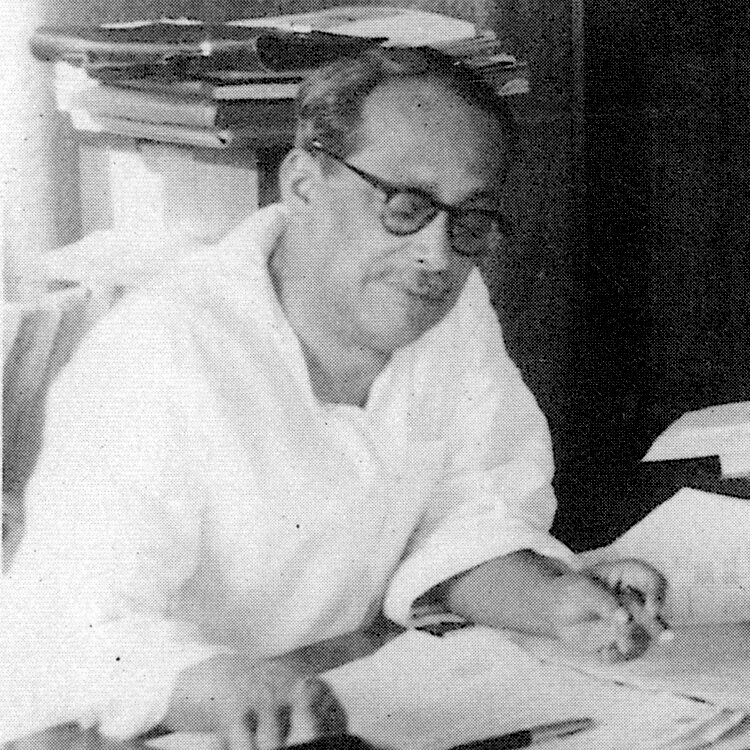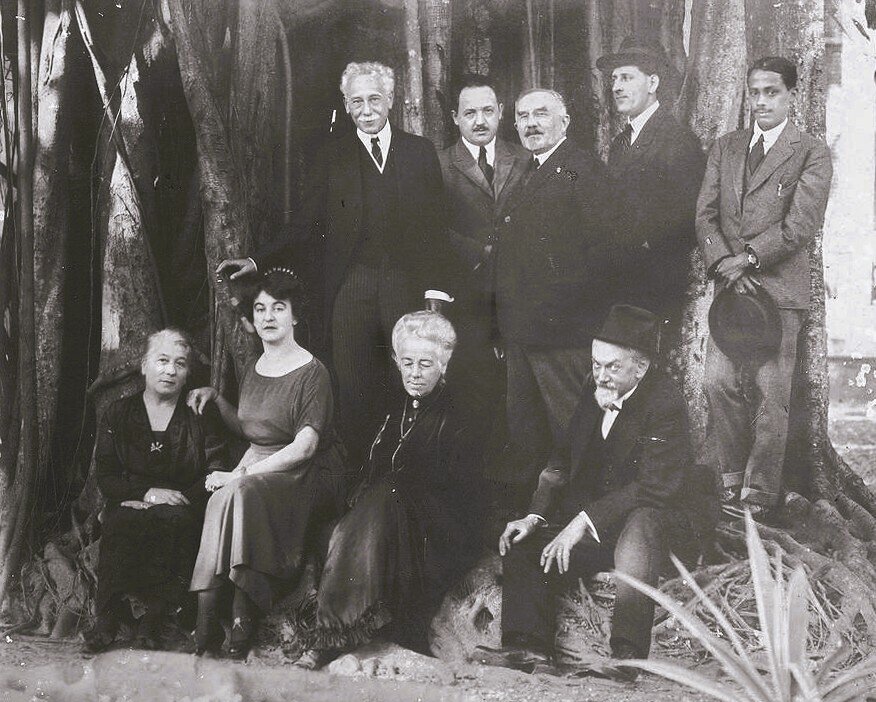P.C. Bagchi

Prabodh Chandra (P.C.) Bagchi প্রবোধচন্দ্র‑বাগচী (18 Nov 1898, Jessore, Bengal, British India (now Magura, Bangladesh) – 19 Jan. 1956, Santiniketan, West Bengal, India) was a noted Sino-Indologist of the 20th century, and the third Upacharya (Vice-Chancellor) of Visva-Bharati University, founded by poet Rabindranath Tagore.
Dr. P.C. Bagchi graduated from Krishnagar Government College in 1918 with honors in Sanskrit, receiving the Mohini Mohan Roy award, then obtained his MA in Ancien History and Culture at Calcutta University in1920. He was awarded a gold medal in the Religion Section and overall had stood first in the university.
As a lecturer at Calcutta University (now Kolkata), he started learning Chinese, Japanese, German, and later on advanced Chinese and Tibetan from Sylvain Lévi, Professor of Sanskrit and Indian Civilization at Sorbonne University, Paris, France. In 1922, he joined Lévi and his wife in a research trip to Nepal, finding original manuscripts and Tibetan and Chinese manuscripts of old Sanskrit texts which were lost in their originals but preserved in their translations at the Royal Durbar Library of Nepal, in particular the palm leaf manuscripts of Kaula-Jnana- Nirnaya and Sammoho Tantra.
That same year, P.C. Bagchi was awarded the Rashbehari Ghosh Travelling Fellowship, traveling to Indo-China, Cambodia, Cochin-China and Japan, and working with Sylvain Lévi, Louis Finot, George Groslier who established a renowned museum in Phnom Penh, National Museum of Cambodia, Henri Parmentier and Henri Marchal in Angkor, attending Professor Aurousseau’s Chinese classes in Hanoi, then staying at the Monastery of Koyasen in Japan. Between 1923 and 1926, he pursued his studies in Paris, under the supervision of Sylvain Lévi, Paul Pelliot, Henri Maspero, the Pali specialist Jules Bloch, and Antoine Meillet, and received his PhD at Paris University.
In 1929 and 1930, Bagchi returned to Nepal again to carry on his research from the Chinese and Tibetan manuscripts on Tantrik Buddhism (Vajrayana), Buddhist Siddhacharyas, Charyagiti (Charyapada) and Dohakosa (Dohakosa of Tillopada and Sarahapada). In 1931, he founded the Philological Society in Calcutta with Professors Suniti Kumar Chatterjee and Sukumar Sen, which merged in 1938 with the Indian Linguistic Society. In 1945, he joined Visva Bharati University at Santiniketan as Director of Research Studies under the Chinese Cultural Studies Scheme on a special grant from the Chinese Government, then was selected for the new Chair Professorship at Peking University, China.
As a sinologist, he expanded his research to subjects such as the nomadic movements in early Central Asia, the history of the relations between Tokharistan and Eastern Iran, the history of the early states in the oases of Chinese Turkestan, the uses of the Indian scripts and languages in Central Asia. In 1954, P.C. Bagchi delivered a series of scholarly lectures in memory of Adhar Chandra Mukherjee at the Calcutta University on the topic of India and South East Asia, a theme that had been scarcely explored so far.
The scholar also took an active part in the Indian nationalist movement, helping in the founding of the “Association des Etudiants Hindous de France” (Association of Indian Students of France) in the 1920s.

P.C. Bagchi (standing far right) in the gardens of Hanoi EFEO headquarters in Hanoi, late 1922 with his mentor Sylvain Lévi (far left). Standing between them, left to right, Léonard Aurousseau, Louis Finot, and Paul Demiéville. Seated, from left to right: Désirée Sylvain-Lévi, Jeanne Leuba, Miss Lulius van Goor and Henri Parmentier. [coll. EFEO]
P.C. Bagchi (standing far right) in the gardens of Hanoi EFEO headquarters in Hanoi, late 1922 with his mentor Sylvain Lévi (far left). Standing between them, left to right, Léonard Aurousseau, Louis Finot, and Paul Demiéville. Seated, from left to right: Désirée Sylvain-Lévi, Jeanne Leuba, Miss Lulius van Goor and Henri Parmentier. [coll. EFEO]
Works on P.C. Bagchi’s scholarly contribution
- Contributions of P.C. Bagchi on IndoTibetology, edited by Prof Haraprasad Ray, The Asiatic Society. ISBN13 978−81−7236−117−4.
- Prabodh Chandra Bagchi, a biography, by Ratna Sinha, Kalyan Kumar Sarkar, Suniti Pathak, Haraprasad Ray and B.N. Mukherjee, Paschimbanga Bangla Akademi, Kolkata; published alongside Prabandha Samgraha (a collection of essays) by Probodhchandra Bagchi , ed. Prof Jyoti Bhusan Chaki. ISBN 81−7751−019−3.
- India and Asia: P.C. Bagchi Centenary Volume, ed. Prof BN Mukherjee, Progressive Publishers, 2009. ISBN13 978−81−8064−116−9.
Selected Publications
- Le canon bouddhique en Chine. Les traducteurs et les traductions. Geuthner, Paris 1927 – 1938 (2 vol.).
- Deux lexiques sanskrit-chinois. Fan yu tsa ming (《梵語雜名》)de Li Yen (禮言) et Fan yu ts’ien tseu wen (《梵語千字文》) de Yi-tsing (義凈). 2 vol. P. Geuthner, Paris 1929 – 1937.
- Studies in the Tantras, Part I, University of Calcutta, 1939.; repr. Calcutta University, 1975.
- Pre-Aryan and Pre-Dravidian In India, 1929: Calcutta University; reprinted by Calcutta University, 1968.
- Kaula-Jyana-Nirnaya and some Minor Texts of the School of Matsyendranath, Calcutta Sanskrit Series, 1934, pp. viii, 92 – 148, Metropolitan Printing and Publishing House: Calcutta.
- India and China: a thousand years of cultural relations. Published in Greater India Society, Bulletin 2, Calcutta in 1927 First Edition 1944, China Press, Calcutta; Second Edition 1950, Hind Kitab, Bombay; Third Edition 1951, Philosophical Library, New York; Fourth Edition 1981, Saraswat Library, Calcutta; Fifth Edition 2008, Munshiram Manoharlal Publishers Pvt Ltd, New Delhi. ISBN 978−81−215−1197−1.
- “Zhong-Yin Qiannian Shi” (translated from Chinese) 2008, Indian Embassy, Beijing. ISBN 978−81−215−1197−1.
- India and Central Asia: 1955, National Council of Education, Jadavpur, Calcutta.
- She-Kia-Fang-Che, Visva Bharati, 1959.
- Indological Studies — A collected works of Dr. P. C. Bagchi, vol. I, Visva Bharati, 1982.
- [In Bengali] Buddha Dharma O Sahitya, Bharat O Indo Chin, Bharat O Chin, Bharat O Madhya Asia, Visva Bharati Press.
- [In Bengali] Probondho Shamgraho, Bangla Academy.
- Related Publications
